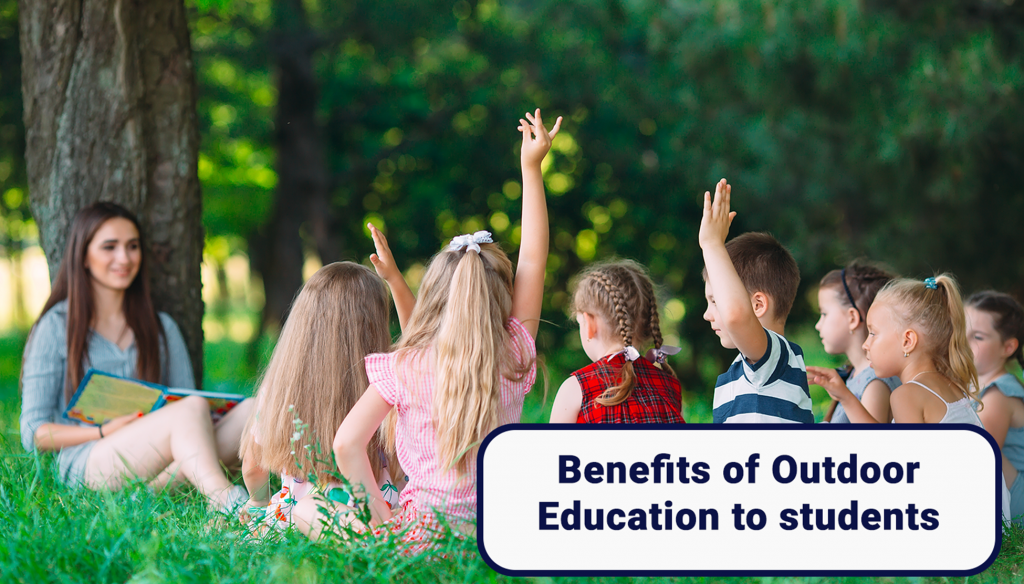Do you recall all of your classmates stepping outdoors to gaze at trees or examine other types of flora and wildlife while you were in school? While most children in public schools have the opportunity to participate in a field trip outside of the classroom either once or twice a year, it is not always the usual for kids to appreciate the outdoors as part of their academic experience. Evidently, kids who are denied access to outdoor education may be denied the chance to flourish either academically and socially. In this blog, we will have a look at the benefits of outdoor education and learning.
Most schools have designed their curriculum with the relevance of outdoor education during a child's developing years. Most schools recognize the importance of providing an atmosphere, where children can explore individually, and even parents recognize the importance of this feature in a child's early development. The necessity of getting outside for adolescent education is often underestimated, with a concentration on classroom teaching, standardized testing, and, of course, the extended time of distant learning that students endured during COVID-19. There are, however, several advantages to integrating nature and the great outdoors into children's learning surroundings.
Here are some of the reasons why getting children outdoors is so vital for their education
1.Increased physical activity
This is the fundamental and most important advantage of outdoor learning. When a child is outside with plenty of room, he/she prefers to run, play, and leap with her friends and is generally excited about the surroundings. Physical exercise increases bone formation, bodily coordination, balance, and flexibility. All of this is critical, and it is also linked to fine motor abilities, which aid with writing, sketching, and creating.
2.Improved social skills
Children are pleased when they are outside, and this might be an encouragement for them to make friends with their classmates. This type of identity engagement teaches kids appropriate social skills and enhances their emotional view on individuals outside of their homes. They have the courage to begin constructive interactions with their peers and instructors as they feel more relaxed and powerful when they are outside.
3.Making learning more relevant
Interest drives children, as well as the state of nature feeds that passion. Using the environment as a classroom changes the educational emphasis away from independent sources and toward primary sources. Many teachers use films, lectures, and texts as teaching aids. Applied learning via practical projects and first-hand exposure encourages children to establish connections and remain interested.
4.Accommodates different learning styles
The truth is that we really do not all follow the same path when it comes to learning. Other students can learn better and faster with images, some with words, several with physical contact, some of it in teams, and so on. Today's classrooms are predominantly text-based, making it difficult for different types of learners to stay interested. Outdoor classrooms enable evidence sources that may adapt and integrate many sorts of learning styles.
5.Improved health and well-being
Many countries are dealing with obesity in children and other illnesses caused by unhealthy and inactive lifestyles. Outdoor play promotes physical exercise as well as learning. Time spent outside increases emotions of joy and happiness and has been shown to lessen stress and anxiety. It also aids in the treatment of attention deficit hyperactivity disorder (ADHD) and other behavioral condition symptoms.
6.Better behavior and reduced stress
Parents of children with attention deficit disorder will vouch for the advantages of outdoor education and learning. This is true for all youngsters who are at risk of emotional upheavals at the flip of a hat. Outdoor play can help to settle their tensions, and you may see better behavioral results for the remainder of the day as well. Playing in parks, particularly around monkey bars can assist children with sensory requirements in calming their bones and easing muscular stiffness.
7.Acquires practical knowledge
Outdoor knowledge allows youngsters to adapt what they've learnt in the classroom to the actual world. Natural learning allows children to experience nature, relate educational experiences to the outdoors, and broaden their actual knowledge. When children interact with their surroundings personally, they command credibility for their surroundings, the possibility to develop a desire for the land, water, animals, and the capacity to understand by the receiver their role in the beauty of nature. All of these activities are formative practical experiences that supplement what children learn in school and assist to nurture a child's desire for learning.
8.Increased motivation
Children of all ages have a fundamental desire to move about. A sufficient quantity of physical activity outside refreshes both the mind and the body. Following that, youngsters are content, motivated, and calm to engage in indoor activities. They can concentrate better on the work at hand since play activates neurological connections in the brain and aids in emotion regulation, planning, and problem solving.
9.It fosters creative thinking and imagination
Learning outside encourages students' imagination and helps them solve problems. It encourages more hands-on, active, inquiry-based learning in a practical situation. Seeing wild animals, hearing new noises, and having fresh experiences help to break up our metropolitan patterns.
10.Outdoor education just gives a lot of fun!
Growing up, education consumes a large portion of our time. It's a lot of fun to play while studying. Children have an innate need to play outdoors, and bringing the classroom outside can assist in blurring the borders between academic learning and creative play. Yes, education can be enjoyable and encourage active and involved lifelong learners.
Classrooms are a relatively new invention. We learn best from one other and from the world around us, making the natural environment the most potent learning resource on the planet. These are some of the advantages of outdoor education that schools have discovered.
Vikas Concept is one such school to understand the importance of outdoor education and learning and helps encourage students with outdoor education for all the grades. Vikas has created a method for efficiently combining the spirit of several curricular organizations and providing holistic education that extends beyond the four walls of the classroom. With the support of a dynamic curriculum, we envisage a learning environment that nurtures overarching ideals and multivalent capabilities in developing persons. To know more about Vikas, do contact or just click here to get a quick admission of your kid.















